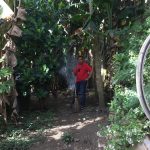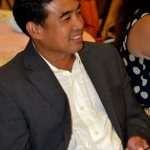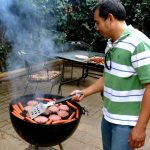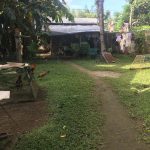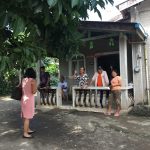In the Philippines
I’m the eldest, and growing up, I carried a lot of responsibilities. Just like, it’s the structure of the family. Everything, every little thing that my little brothers and sisters need… If my parents cannot do it, or they don’t have time to do it, the task or responsibility comes to my shoulders… But growing up, I learned a lot just because of hardships. I had a lot of chores or responsibilities at home that, before I can do something else for myself, I have to do a lot of things for my family first.”
My father, Froilan Dumaraos Carlos was born on March 27, 1969 in San Pablo, Laguna, Philippines to a mother and a father. A few years later, his brother, Eric, was born. Unfortunately, when he was about six or seven years old, his mother passed away. His father soon remarried, and had several children with my father’s stepmother.
The Philippines is a very diverse country with numerous ethnicities and indistinguishable languages. In my father’s region, the importance of the hierarchy within a family structure is heightened. Within the nuclear family, the eldest son has a lot of responsibilities in the household, and he is expected to care for his siblings whenever the parents cannot, which, in the labor-intensive lifestyle of a lower-income family in San Pablo, is fairly often. My father said that his father raised him this way in an effort to instill in him a responsible character. This elevated importance of family hierarchy also extends to the extended family. My father also played the role of the eldest grandson who not only holds these responsibilities within his own nuclear family, but also in his extended one. As the eldest grandson, the rest of his cousins must look up to him and respect him almost as an adult or leader within the family. He noted that oftentimes he had to help the adults, which included his grandparents, parents, aunts, and uncles, make decisions concerning the family.
Basically, when you are the elder son or the eldest son, you basically has a lot of responsibility, and they tried to, kind of, mold you into, kind of… trying to decide things in the future, so you basically are part of the leadership back home, in your family.
Forced to grow up quickly, he found ways to contribute financially to his family. He mentioned doing a number of jobs, such as selling things, in the town market and on the street, and helping vendors transport their goods to the market. He would often do these jobs before and after school, as well as during vacation times when he had no school at all.
I would be sleeping, like, on the street in the cardboard box waiting for the bus.
In the Philippines, my father says, it is very hard for a student to go to college, because there are not systems in place to help students financially, as there are in the U.S. (for example, extensive financial aid, loans, grants, etc.). In the mid-1980s, when my father was about 16 years old, his uncle, who essentially had helped raise him, told him about an opportunity for him to study in the Soviet Union. The program would only take 50 Filipino students a year to the Soviet Union, and, there, in addition to university-level education, they would be provided with housing and a monthly stipend. Knowing that college in the Philippines would heavily burden his family financially, my father decided to go through the extensive application process. He took a series of examinations, competing against his peers on a national level. After surpassing a specific qualification level, he found out that he was one of the handful of Filipino students chosen to participate in the program. His intention was to become a doctor, and when I first went to the Philippines in 2010, one of his aunts showed me an article in a local newspaper that featured my father and his accomplishment, stating that he was leaving to study to become a neurosurgeon. For my father, going to college in the USSR seemed like the perfect opportunity to get a degree, get a job, and come back to continue to provide for his family.
In the Soviet Union and Russia
When asked about his time in the Soviet Union, he recalls many struggles. Firstly, he mentioned the vastly different language and culture. However, by and large, the most difficult challenged he faced was surviving financially. He told me that the university stipend was only about $80 each month, which was meant to be spent on a month’s worth of food. This posed a very large problem, particularly after the fall of the Soviet Union. After the dissolution, the prices of everyday commodities and food shot up, and the increased cost of living drove many students to drop out. Unfortunately, he was one of the many students that had to stop studying to support himself financially.
After dropping out, he found work in the American Embassy in Moscow. He worked in the cafeteria, first doing dishes, then waiting, then cooking in the grill line. After my mother left Moscow in 1996, he received a visa from the American Embassy, where he was working, to follow and, later, marry her.
In the United States
His first job after arriving in the US was a housekeeping and babysitting job. When I was a young child, my father went to trade school, and became an electrician. He worked at William G. Hyman Electrical, a small electric company for nearly 10 years. He ended up quitting after he became certified as a master electrician, yet did not receive a raise. He began establishing himself as an independent electrician about halfway through my high school career, and so, initially, his income fluctuated very drastically and was unpredictable. However, he has began to get his name out there, and his business is beginning to blossom.
He returned to the Philippines only in December 2010, nearly 25 years after he left for college. We visited again after six years, in December of 2016.
- One of his cousins’ homes, behind his Uncle and Aunt’s house.
- The path from his Uncle and Aunt’s house to his cousins’ homes.
- His Uncle Bio and Aunt Minerva’s home, where he spent some of his childhood.
